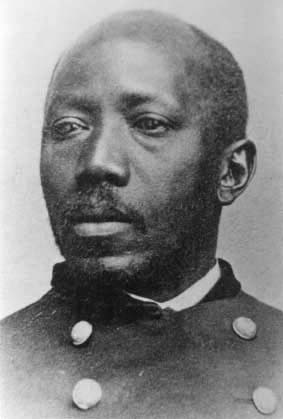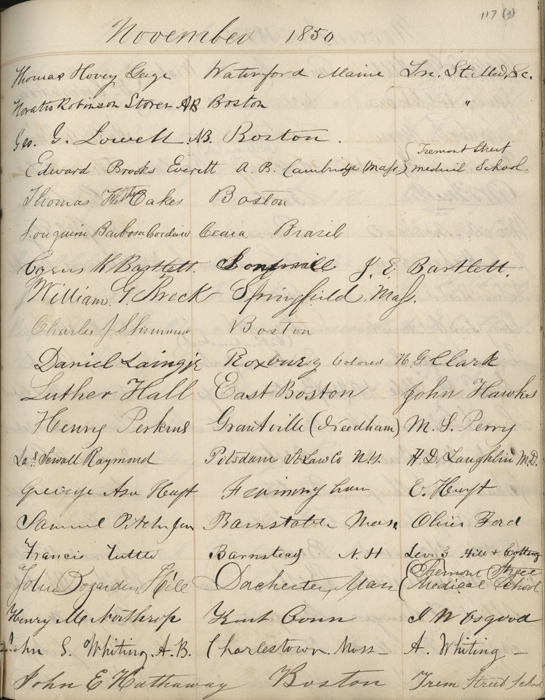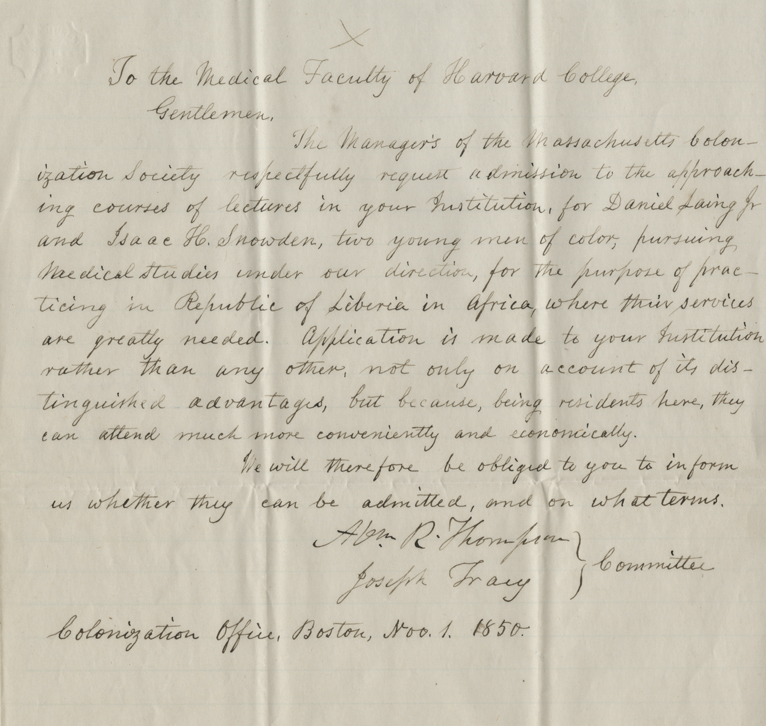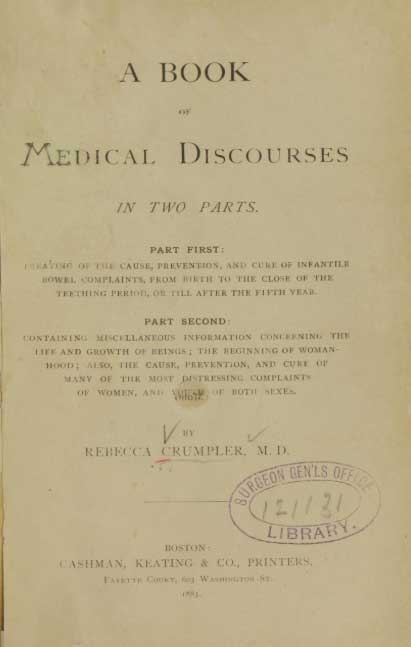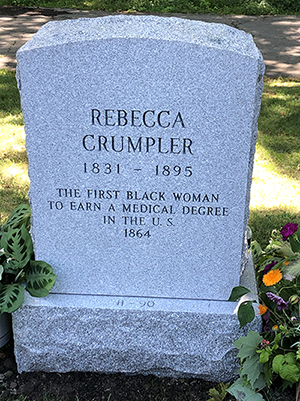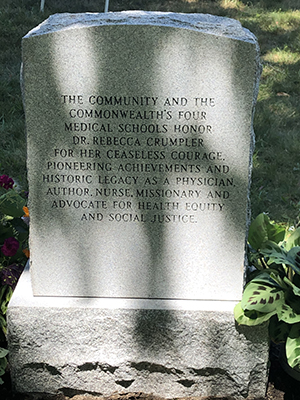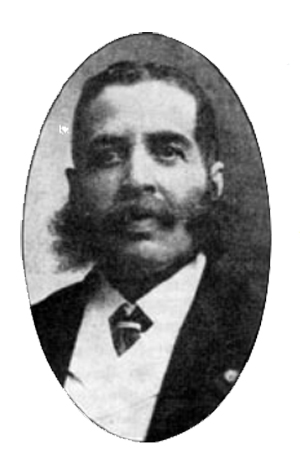1850
1871
African American Trailblazers at Harvard Medical School
Harvard Medical School (HMS) was founded in 1782; a history of the evolution of the medical school is available in the exhibit Broad Foundation. The first Black students and woman student enrolled at HMS in 1850.
The three Black students, Daniel Laing Jr., Isaac H. Snowden, and Martin Robison Delany, had completed all requirements for admission. In 1850, potential students needed to complete three years training under a physician, evidence of good moral character, and a college degree or a demonstration of knowledge of Latin, mathematics, and the basic sciences.
In October 1850, the Medical Faculty received two letters from clergy and the American Colonization Office urging the faculty to accept Laing and Snowden so that they could practice medicine in Liberia. The faculty met on November 2, 1850 to discuss both letters. Although the decision was not unanimous, the faculty admitted Laing and Snowden.
Shortly after the vote, Delany, applied in person to Dean Oliver Wendell Holmes. He had applied to several medical schools, and all denied his admission. He brought seventeen letters of recommendation endorsing his character and intelligence. After the meeting, Dean Holmes accepted Delany as a student for the winter term.
During this time, Hariot Kezia Hunt, a forty-five year old woman who practiced medicine in Boston, and who had applied to HMS routinely since 1847, was also given permission to attend medical lectures.
Within weeks, students sent letters and petitions to the faculty, both for and against the presence of these four students.
Unanimously, students agreed that Hunt, as a woman, should not attend HMS, but strongly debated the Black students. Ultimately, the student protesters agreed that Black men should study medicine, but not at HMS.
In Nora Nercessian’s 2004 book, Against All Odds on page 21, the faculty minutes read: “That the Dean be instructed respectfully to inform the gentlemen acting as agents for the Colonization Society, that this Faculty deem it inexpedient, after the present course, to admit colored students to attendance on the medical lectures.”
Faculty debated how to proceed during meetings in December and January. Hunt decided not to attend lectures, and the faculty voted to allow the Black students to finish the term, with the caveat that no other students of color could attend lectures in the future.
Laing, Snowden, and Delany left HMS at the end of the winter term in March. Both Laing and Snowden went on to study medicine at Dartmouth College, and all three went on to practice medicine.
After the Civil War, HMS changed its policy, although sources do not detail debate over the decision. Two Black students, Edwin C. J. T. Howard and Thomas Graham Dorsey, graduated from Harvard Medical School in 1869. A third student, James Thomas Still, graduated in 1871. At the Harvard School of Dental Medicine, Robert Tanner Freeman and George Franklin Grant both matriculated in 1868. Freeman graduated as part of the first class in 1869 and Grant graduated in 1870.
Today, the medical school presents the Howard, Dorsey, Still Lecture and Diversity Awards Ceremony named in honor of the first three Black students to graduate. Nercessian’s book Against All Odds explores the stories of students of African descent at Harvard Medical School prior to affirmative action. The entries below draw strongly from her work.
Key People
Martin Robison Delany (1812-1885) was born in Virginia; his father was enslaved while his mother was a free woman. Delany applied to Harvard Medical School at age thirty-eight, and had applied to several medical schools. He was a student of Latin and Greek, and a member of Pittsburgh's African Education, Antislavery, Temperate, Philanthropic, Moral Reform, and Young Men's Bible Societies. When Delany applied in person to Harvard Medical School, he had seventeen letters of recommendation from physicians in Pittsburgh and Allegheny, Pennsylvania, as well as three letters from clergymen, endorsing Delany's character and intelligence.
After leaving Harvard Medical School, Delany went on to become a leader in several arenas, including abolition, reconstruction, and medicine. He was a physician, author, activist, and soldier, and is considered by many to be the father of Black Nationalism. Delany died in 1885 in Wilberforce, Ohio.
More information about Delany's life and accomplishments are available at blackpast.org and Martin Robison Delany (1812-1885): physician, black separatist, explorer, soldier by Louis Rosenfeld, PhD.
Daniel Laing, Jr. (died 1869) was born in Boston, Massachusetts and had been an independent printer before applying to Harvard Medical School. He asked the Boston Colonization Society for assistance to go to Liberia, and was urged by the Society to study medicine. His application to Harvard Medical School included recommendations from local clergy, the Boston Colonization Society, and Dr. Henry Clarke, a physician associated with Massachusetts General Hospital.
After his expulsion from Harvard Medical School, Laing studied under the French surgeon Alfred-Armand-Louis-Marie Velpeau in Paris, studied at the Royal College of Surgeons from 1852 to 1853, and finished his medical degree in 1854 at Dartmouth Medical School. He worked as a physician for the American Colonization Society thereafter and died in Charleston, South Carolina in 1869.
Isaac Humphrey Snowden (1826-1869) was born into an activist family; his father was a minister in the African Methodist Episcopal Church in Boston, and four of his seven siblings were abolitionists and social reformers. Prior to attending Harvard Medical School, and then for two years after, Snowden studied under Dr. Henry Clarke of Massachusetts General Hospital in Boston. In November 1853, Snowden reapplied to Harvard Medical School under the auspices of the American Colonization Society. Snowden approached students for support, and seventy-five out of a class of 118 students supported his readmission with a petition. Despite overwhelming support from the student body, the faculty denied Snowden admission. According to the annual report of the Colonization Society, Snowden left for Liberia in 1854 with Daniel Laing, Jr.
Graduated Harvard Medical Class of 1869
Few documents exist that detail the life of Thomas Graham Dorsey. Dorsey’s name first appears at Harvard Medical school as a matriculant in the Catalogue of 1867-1868. Dorsey began his medical studies in Philadelphia with Dr. J. M. Leedom of Germantown, who helped to arrange payment for classes at Harvard Medical School. Records indicate that Dorsey moved to Washington D.C. after 1869 and died in 1897.
Rebecca Lee Crumpler, MD (1831-1895), graduated from the New England Female Medical College in 1864. She was the first Black woman to earn a medical degree in the United States and the only Black woman to graduate from the New England Female Medical College, which was absorbed by Boston University in 1873. No photos survive of Dr. Crumpler, and the only details we know of her life come from the introduction to her book, A Book of Medical Discourses, published in 1883.
On July 16, 2020, a gravestone was dedicated to Dr. Rebecca Lee Crumpler during a ceremony held at Fairview Cemetery, in Hyde Park, Massachusetts. Dr. Crumpler’s headstone commemorates her achievement as the first Black woman to earn a medical degree in the U.S. The ceremony also honored her husband, Arthur Crumpler who escaped slavery in Virginia and learned to write and add in Boston. A Boston Globe article by Brian MacQuarrie, July 17, 2020, notes that for more than 100 years, their graves were unmarked. The gravestones were made possible through the contributions of Boston University Medical School, Harvard Medical School, Tufts University School of Medicine, the University of Massachusetts Medical School, and the community at large.
Graduated Harvard Medical Class of 1869
Edwin C.J.T. Howard was born in Boston on October 21, 1846, and attended Boston Latin School. He studied at Liberia College in Monrovia, Liberia from 1861 to 1865 and under Dr. Charles B. Dunbar. He returned to Boston and his name appears in the “Catalogue of Students Attending the 1866 Summer Session.” Howard graduated in 1869; his thesis was on Puerperal Fever. After graduation, Howard entered the practice of medicine in Charleston, South Carolina and then moved to Philadelphia, Pennsylvania, where he was instrumental in establishing the Frederick Douglass Memorial Hospital in 1895. He was also instrumental in establishing the Mercy Hospital in Philadelphia in 1905 and the Sigma Pi Phi Society, the first Black fraternity in the United States. Howard died of diabetes on May 10, 1912 in his home in Philadelphia.
Graduated Harvard Medical Class of 1871
James Thomas Still was born July 12, 1840, in Medford, New Jersey, the grandson of runaway slaves and the son of Dr. James and Henrietta Still. Two years after the end of the Civil War, Still matriculated and is first listed in the Catalogue of Students for the winter class of 1867-1868. He graduated with honors in 1871, having written a thesis on “Hay Asthma and Hay Fever.” He remained in Boston after medical school and practiced medicine at 166 Cambridge Street. He was the first African-American elected to the Boston School Board and served as surgeon in the 2nd Battalion of the Massachusetts Volunteer Militia from 1871 to 1874. He died on June 22, 1895, after a short illness from Bright’s disease.
